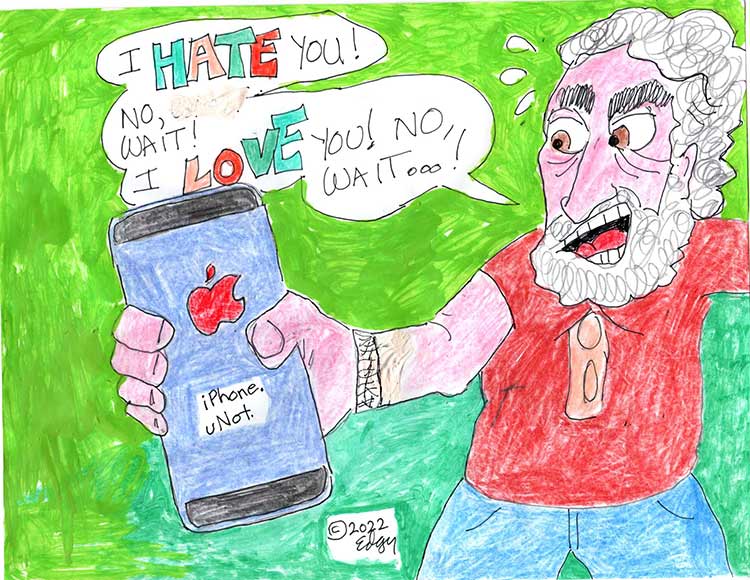On Losing One’s Cellphone. —Well, My Cellphone
A cry for help, with special guest star Vlade Divac
By Ed Goldman
Listen, I’m sure I’m not the first person to misplace his, her, their, our, your, or its cellphone. (I hope that covers everybody with a pulse. And even those without one. I try to be inclusionary at all times, except when I don’t like someone.)
Nor was this the first time I’d ever misplaced my phone. But this time was different.
The hard cell
This time, I tore apart my car’s already critically wounded upholstery, ransacked my condo and reached into the pockets of my jacket, shirt and trousers approximately six times each—even the ones I hadn’t been wearing when the phone went missing. I’m at that age—and in truth, have always been—at which I can’t always faithfully duplicate my actions, retrace my steps or remember what I just misplaced and why it’s suddenly so damned important I do.
This makes relationships challenging, as you might imagine.
Unlike a lot of people, the only somewhat personal items I store in my phone are the occasional openings of stories I’m working on and poems I intend to fix before sending them to my OSSO (oh-so-significant-other, if you’ve just joined us). I rarely input a shopping list. I simply don’t like walking through a supermarket and having to glance down at my phone from not only aisle to aisle but sometimes bin to bin to see if I really did want mangoes or just thought it made me seem cool to pretend I like them.
I don’t. Mangoes taste like oranges that couldn’t afford a better press agent.
What I don’t have in the phone are my calendar, social security number, credit card numbers, name and address, and personal goals, though I believe there’s an app for the latter. I know there’s a paper equivalent in those cumbersome day-planners that people used to lug with them to meetings, which just looked like truss bait.
I do have phone and text numbers, of course, but none of them are of value to anyone but me. For example, I don’t have the private lines in my little directory of elected officials I’ve either worked for or made fun of. I’m just paranoid to think that if some harm befell one of them, some all-seeing surveillance expert would be able to find out I had the numbers and somehow tie me into the officials’ demise. No thank you. We have a no-assassinations policy here at The Goldman State. In fact, our unofficial motto is, “All we kill is time.”
For a while, I did have the private phone number for NBA star Vlade Divac’s chiropractor. Explanation: Vlade’s wife was a marketing client of mine for a short time. One day when I went to L’Image, the restaurant she owned, for a meeting, Vlade was there having lunch and saw me walk in so bent over I’m sure I resembled an animated question mark. (In those days, as I’ve written, my back went out more often than I did.) He took pity on me and gave me the guy’s number.
But I never did call him. Vlade and his wife left Sacramento not long thereafter, so I deleted the number.
Many people hang onto their land-line phones even if the only phone they really use is their cell. For just as we use microwave ovens mainly to reheat our coffee, land lines can be useful if you misplace your cellphone, principally because they allow you to call yourself.
This doesn’t help if you’ve left your phone out of earshot, natch—like in a bar, someone else’s apartment or, as I did once, on the roof of my car before speeding off and having it slide off the rear bumper and onto a bridge over the American River. (It was found by a guy driving behind me; he called me late that night and returned it to me the next day. Still don’t know how he knew how to reach me.)
The most recent time I lost my phone was at my neighborhood Safeway store. I didn’t realize that as I went on the search-and-destroy mission recounted in Paragraph 3—but to my credit, if any is due, I did admit to myself that the phone wasn’t in the aforementioned car, condo or clothes, no matter how much I wished for it and began negotiating with the Lord My God.
I arrived at the store in record time, considering this was Rush Hour (driving like a maniac in times of duress is greatly underrated for its efficacy). There, Aaron the cashier greeted me as I entered, saying, “Hi, Ed, did you lose something?” Huge grin. He said he’d seen I left the phone on his little grocery treadmill and I could reclaim it a few feet away at the store’s customer service window—which I did, after convincing the fellow manning it that yes, the phone he was holding was mine and no, my name wasn’t Bob.
“Bob was my dad’s name,” I said just to make him feel better about the gaffe.
“So, did he give you his phone?” he asked as I snapped it from his grip.
“Yes. The last thing he did before he died in 1976 was hand me a yet-to-be-invented cellphone and say, ‘Son, someday all of this will be yours.'”
“Sounds like a good guy,” the fellow said. “My dad was like that.”
Ed Goldman's column appears almost every Monday, Wednesday and Friday. A former daily columnist for the Sacramento Business Journal, as well as monthly columnist for Sacramento Magazine and Comstock’s Business Magazine, he’s the author of five books, two plays and one musical (so far).
Yes, Virginia
A Weekly Blog by Virginia Varela
President, Golden Pacific Bank, a Division of SoFi Bank, Inc.
photo by Phoebe Verkouw
Over the years, I’ve had my share of challenges as an organizational leader— and frankly, I still consider myself to be in constant learning mode.
However, I am proud that I have always strived to promote a workplace culture that promotes employee engagement and satisfaction. These are values that are essential to me. I truly believe that it’s the responsibility of management to foster a workplace where employees are willing to go above and beyond in their work and promotion of the company.
And it pays off: employees tend to stay and be engaged into the future, growing long with the company.
In these days of staffing shortages, recruitment challenges, high staff turnover and new concepts like “quiet quitting,” it’s important for business leaders to step back and consider the company’s culture—the work hours, location, communication, management style, traditions, and as much transparency as possible.
Great companies develop a very real community around their employees, with common vision and support for everyone’s goals. They celebrate milestones and special events, offer solid pay and benefits, and are willing to change and reassign employee roles to best fit their skills.
In healthy work environments, employees are trusted to work hard and make good decisions. By the same token, employees need to trust business leaders to support and guide them. They need to feel a pervasive sense of fairness—that they receive adequate compensation and have the same opportunities as their colleagues.
Communication—conversations between managers and employees, a sense that the leadership is approachable—is a vital component of successful companies.
So, too, is innovation. The companies that are constantly creating new products and strategies can be exciting places to work. Innovative companies encourage employees to take risks, share ideas and make suggestions. Employees are motivated and proud of their work.
Employees are the most important “commodity” a business has. Treating them as intelligent, sensitive, well-meaning individuals—and as a devoted team—may be the best shortcut to a company’s continued success.
sponsored content











